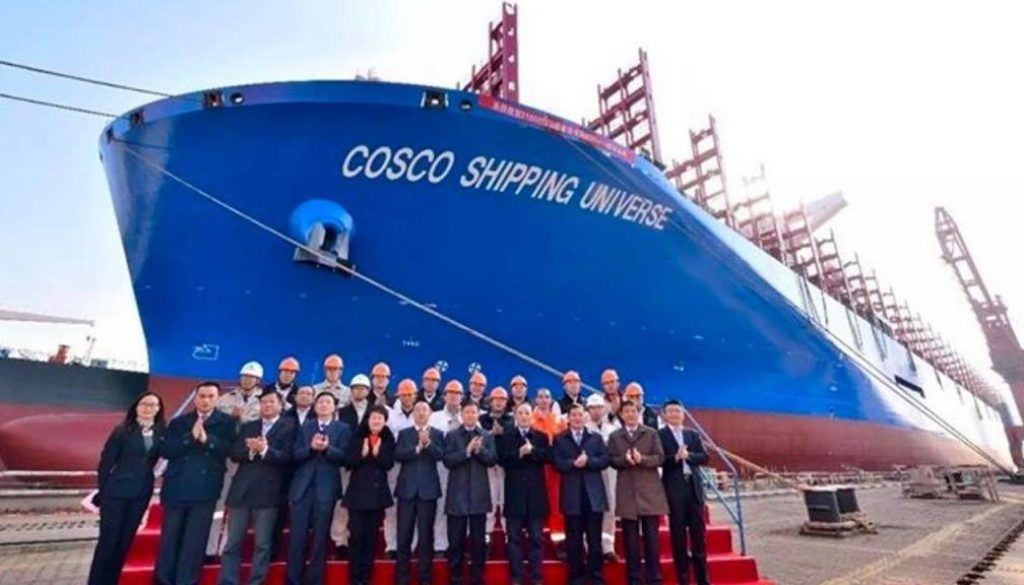China: Almost… King of World Trade
Over the past two decades, China has been rapidly monopolizing every aspect of world trade; from trying to buy the world ports in nearly many countries around the planet to being the supplier of nearly 30% of the world’s goods, China has made itself the king of every aspect of trade, except shipping.
Despite its dominance in the sea, China still lags behind countries as small as Japan and Greece regards to its shipping power. Japan, by most metrics, is the second most powerful shipping nation in the world while having a population that is less than 10% of that of third place China. Nevertheless, Japan’s superiority in the shipping industry is a result of its geographic location with no land borders with other countries which forced it be one of the top shipbuilding nations in the world for the past 100 years. However, the true shipping superpower of the world is actually the small Mediterranean nation of Greece.
Greece: The World Shipping Superpower
Greece has a population of just 10 million people, and yet despite having this small population which in perspective is 140 times smaller than China’s, Greece has been the world’s shipping superpower for much of the past 50 years.
This brings up the question of how did such a small country become the dominant player in one of the world’s largest industries?! And what does this mean for the ordinary citizen, the economy and the world’s superpowers?
Looking at the map of Greece, one can instantly understand the reason behind its superior shipping industry over the last 2,000 years. First, 80% of Greece is covered in mountains, and even though there are some benefits to having a mountainous country, one of the downsides is that it is tough to grow large quantities of food in mountainous regions. So throughout history, Greeks have turned to the sea to get fish and trade in order to get food like wheat and resources like gold. Secondly, Greece is the nation with over 6,000 islands, hundreds of which are populated, meaning that having an up-to-date shipping industry is vital for the population centers on these islands. Lastly, Greece is in the unique geographical position in the world; it is close to the Suez Canal, which is one of the most important trade routes in the world, and it (Greece) also has a short land connection to some of the wealthiest European nations. All these factors led to making Greece a maritime and trading nation ever since it made its geographical boundaries.
Aristotle Onassis and the Golden Greeks
It was only until mid-20th century that Greece would practically begin to take over the world shipping industry. In the early nineteen hundreds, Greece was among the top-10 shipping nations in the world, but it was far behind the most powerful countries like Great Britain, the United States and Germany. But after the Greek navy played a key role in helping the Allies win World War II, several Greek businessmen thought of an idea; What if they invested heavily in the shipyards of nations that needed to rebuild from the war? Accordingly some Greek businessmen like Aristotle Onassis took action with that idea. Aristotle Onassis, in 1949, invested in West German shipyards and placed 36 large ship orders during the next several years. He also invested heavily into Japanese and other Southeast Asian countries as well. Then eventually, he began buying up ships that were being sold off by the United States Military after World War II ended. Because of these three factors, Aristotle Onassis would go on to become the largest private shipping fleet owner in the world. Here, it’s worth noting that he (Aristotle Onassis) wasn’t the only Greek that had this strategy; other businessmen like Stavros Niarchos ended up doing the exact same thing. That is why by the 1960s, many Greek ship owners owned the largest shipping fleet in the world. They soon became known as the “Golden Greeks”.
Greek investment into the shipping industry in China helped facilitate China’s growth as a modern trading superpower
This brings us to three fascinating facts:
- At many points throughout the 20th century, the “Golden Greeks” businessmen had a larger shipping fleet than the rest of the European Union combined.
- Even though Japan was the most powerful shipbuilding nation in the world for most of the 20th century, the majority of ships built were sold to the “Golden Greeks” fleet.
- Third and most importantly, as this fact would end up becoming extremely important to our current economy, is that as globalization expanded in the 1970s, Greek ship owners were relied upon to deliver resources like oil, coal and food from country to country. But there was one country which was not yet ready to trade with the rest of the world, surprisingly today, that was China. Then as China shifted its economic policy away from communism, it began taking on some small amounts of foreign investment. As a result, Greek ship owners were able to eventually expand into China while getting large contracts to deliver resources to and from China. So in a sense, Greek investment into the shipping industry in China helped facilitate China’s growth as a modern trading superpower.
The Turn of the Tables
However, the tables would eventually turn between the two countries. In 2008 the global financial crisis made economies around the world collapse, and arguably the hardest hit economy was that of Greece. So while most countries recovered from the financial crisis by around the year 2012, Greece never fully recovered.
China came in and invested in Greece when others refrained – Greek Foreign Minister
In fact, it wasn’t until 2018 that Greece finally had a positive, but small, GDP growth of just 2%. Because of this economic downturn, the Greek government was forced to take some drastic actions in order to prevent the country’s economy from spiraling out of control. So, it Greek authorities began looking for investors to pump money into the economy. But since the country was passing through a debt crisis at the time, nearly every country in the world refused to take the risk of investing into Greece. One country stood out of the crowd, and that one country was a nation that Greek ship owners invested in just a few decades earlier and helped turn it from a poor farming nation into an industrial powerhouse, China. The ties that Greece and China have built over the last several decades due to Greek shipping investments in China have led to China returning the favor by investing back into Greece during the Greek debt crisis. In fact, Greek Foreign Minister put it best when he said that China came in and invested in Greece when others refrained. This explains why Greece sold a 67% stake in addition to the control of the 2000 year old Port of Piraeus to Cosco (China Ocean Shipping Company Limited), which is a Chinese State-Owned company. The selling is of strategic importance since the Port of Piraeus is viewed by many to this day as the “Pearl of the Mediterranean” as it serves as a distribution hub for a network that spans across Europe, Asia and Africa. Now this distribution hub that is located in Europe is controlled by the government of China. This is just part of China’s plan to dominate the world’s trade routes and ports.
Port of Piraeus, the “Pearl of the Mediterranean” located in Europe, is controlled by the government of China
Chinese investments aim to convert this port to the largest in Europe. Ranking 14th largest port in Europe, underperforming and at risk of laying off most of its workforce, the billions of dollars-worth of investments from Cosco, saved Port Piraeus and made it the fourth largest port in Europe and has grown by more than 250% since the initial Investments came in 2009, and most importantly, not one worker was laid during the crisis.
Even though this seems like a completely positive investment by China, however the purchase was controversial and met with some criticism as well, raising the question of Chinese political and economic influence in Europe and how Greece sold off domestic lands to a foreign country.
The Duality
Greek ship owners are dominating the world shipping industry yet Greece itself is struggling in selling off part of its domestic shipping industry.
Despite the dominance of Greek ship owners in the shipping industry, Greece itself dominance in shipbuilding is struggling in selling off part of its domestic shipping industry. It’s also important to note that Greek ship owners may not dominate the world shipping industry for much longer. For example, Japan in recent years, has been ahead of Greek shipping depending on the valuation of products transported. Moreover, if China continues to invest into their shipping industry, it would only be a matter of time before the country of 1.4 billion people invest enough money to surpass a few dozen Greek ship owners, and therefore become the top shipping nation in the world. Another concerning news for Greece emerges from the fact that country’s fleet is by far the biggest shipper of oil in the world as one third- of the world’s oil is transited with Greek ships and about one-third of the Greece’s shipping value comes from these oil contracts. This is concerning since the oil market is facing numerous challenges thus posing serious uncertainties in the market. Therefore Greek ship owners could end up falling behind the likes of Japan and China who are focused a lot more on container shipping, which is for smaller products. It’s clear that container shipping has grown significantly over the last several years with the extreme growth of e-commerce.
The only obstacle that would prevent China from owning the entire consumerism of the global market is Amazon!
If this trend continues, this would lead to China becoming the world’s dominant player in nearly every part of world trade. With the Chinese already controlling the world’s manufacturing imports and exports, having a hand in large corporations around the world and consumers around the world would bring them universal dominance over the major trade dimensions. So, if China controls the shipping industry, then the only obstacle that would prevent them from owning the entire consumerism of the global market is online trade, namely Amazon!
Amazon VS Chinese Domination
Indeed, e-commerce brings benefits to China. For example any online shipping request would involve an entire process of getting that item from the factory floor to your front door, which would mostly be done by a Chinese state-run company. However, there still is one step that gets in the way of the Chinese. And that is usually the very first step in this process, which is Amazon! Jeff Bezos, Amazon’s CEO, is in fact the only thing standing in the way of China having a complete dominance over the global e-commerce industry especially that the second and third largest e-commerce companies in the world are actually Jingdong (JD) and Alibaba, both Chinese e-commerce companies. If the day would come when they (JD and Alibaba) are to surpass Amazon, and China is to surpass the Greek ship owners and take over the world shipping industry, we could see the biggest monopoly of an entire global market that the world has ever seen!



